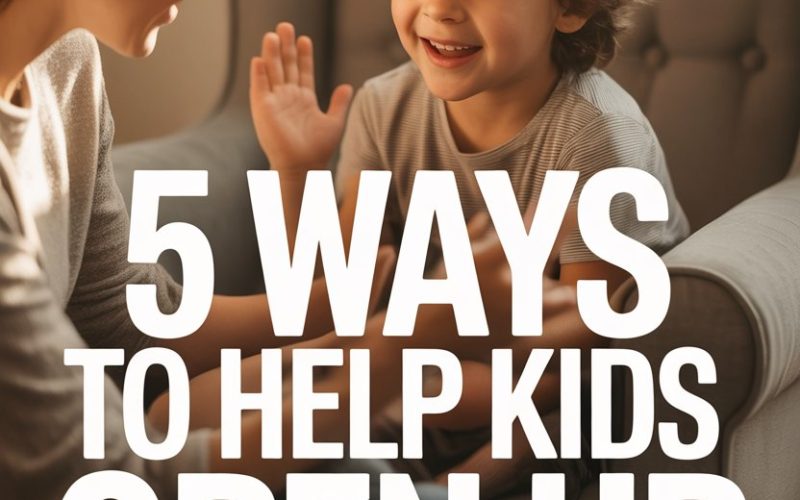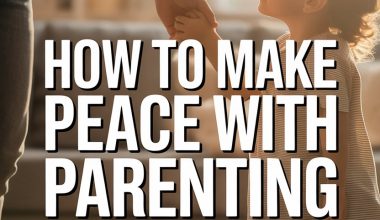Raising children is a lot like gardening: you scatter seeds, pull a few weeds, and pray for favourable weather.
Yet, when it comes to getting those little shoots to talk—really talk—about their thoughts and feelings?
Well, that often feels like coaxing a stubborn tulip out of frozen ground. If you’ve ever tried to get your child to tell you about their day and been greeted with “fine” or “I forget,” you’re not alone.
Busy parents everywhere crave those honest conversations, but without the awkward interrogation vibes.
Good news—kids do want to talk. Sometimes, they just need a little nudge (and maybe fewer questions about maths tests).
Here are five tried-and-true ways to help your children open up, minus the eye-rolls.
1. Create Opportunities for Side-by-Side Chats
Some of the best conversations with kids happen when you’re not sitting across from each other, eyes locked, waiting for a dramatic confession. That’s a surefire way to send many children into “mum/dad’s going to interrogate me” mode.
Psychologists have found that parallel activities—think riding in the car, washing dishes, or walking the dog—lower the pressure and let kids relax enough to let their thoughts tumble out.
No one says, “Tell me your deepest fears” while stacking the dishwasher, yet magic happens over sudsy plates. The simple act of being side-by-side, hands busy, eyes forward, signals safety and gives kids a sense of control.
One study from the University of Cambridge even found that teens opened up more in car rides than at the dinner table.
If you’re running between activities, catching a lift to footy practice is golden time. Pop on a playlist, avoid “So, how was school?” and wait.
Sometimes, all it takes is “I heard the tuck shop serves pizza now” to get a conversation rolling. The less it feels like a formal chat, the more likely young people are to let you in.
2. Ask Better Questions
“Fine,” “Good,” or my personal favourite, “Dunno.”
These are the classic responses when kids are ambushed with generic questions like, “How was your day?” Swapping out these questions for more specific, open-ended ones works wonders.
Try asking, “What was the funniest thing that happened today?” or “Who did you sit with at lunch?” Even the old chestnut, “Was there a moment today you wished you could disappear?” can yield gold.
The trick is to signal that you’re not fishing for trouble—you’re genuinely interested.
Research shows that children are more likely to respond openly when they feel you’re listening without an agenda. So, resist the urge to jump in with solutions or stories about “when I was your age.”
Instead, validate their feelings, however trivial they may seem. If your child says, “Liam wouldn’t let me use his pencil,” don’t respond with, “That’s not a big deal.” To them, it is.
You might strike out a few times. Keep swinging. The right question on the right day can open the floodgates.
3. Share Something About Yourself
Kids see adults as mysterious creatures who’ve got it all figured out. When you share your own (age-appropriate) vulnerabilities, they learn that it’s okay to have worries, make mistakes, or feel awkward.
After all, when you admit, “I used to get nervous before reading aloud in class too,” you’re not just being relatable—you’re modelling openness.
Research published by the Child Mind Institute highlights that children learn emotional openness through example; parents who talk about their own feelings, setbacks, or embarrassing moments encourage kids to do the same.
No need to spill your greatest regrets or launch into a monologue about your boss. Keep it light and relevant: “I was nervous before my big meeting today,” or “I remember losing my favourite toy and feeling gutted.”
These admissions tell kids that tough feelings are normal and temporary.
Sometimes, after you’ve shared, you’ll get nothing but a grunt. That’s fine. You’re planting seeds, and those take time to grow.
4. Make Time—Even if It’s Imperfect
Many parents feel pressured to carve out Insta-worthy quality time: baking cupcakes, building model castles, or painting masterpieces.
Brilliant if you can pull it off, but most of us are just trying to get everyone fed and into bed without a meltdown.
Good news: what matters most is consistency, not Pinterest perfection.
A five-minute check-in at bedtime, a quick chat during breakfast, or even a silly dance on the way out the door counts.
According to Harvard’s Center on the Developing Child, regular, predictable routines build trust and give children the sense that you’re available—no matter how busy life gets.
Don’t stress if your child brushes you off one day or seems uninterested. Tomorrow, they might be ready to talk your ear off about Minecraft strategies or the class pet.
The key is showing up, again and again, even if your attempts feel clumsy.
If all else fails, a midnight snack chat in the kitchen is often where the real stories come out. (Teenagers seem to operate exclusively on a nocturnal schedule.)
5. Embrace the Awkward Moments
Conversations with children (and let’s be honest, with adults too) can get weird, awkward, or downright confusing.
You might find yourself in a long-winded tale about a playground game that makes zero sense, or suddenly confronted with a big, tricky question out of left field.
When the awkwardness hits, resist the urge to fill the silence or change the subject. Silence doesn’t mean you’ve failed; it often means a child is gathering their thoughts or working up the courage to say something big.
According to developmental psychologist Dr. Laura Markham, giving children time to speak—even if it takes ages—shows respect and patience.
If your child drops a clanger (“Why do people die?” or “Did you ever get bullied?”), breathe and answer honestly, within the boundaries of what’s appropriate for their age.
Admitting you don’t know something, or that you need a moment to think, is not a sign of weakness. Kids appreciate authenticity far more than rehearsed, sugar-coated answers.
And if your child brings up something difficult right as you’re heading into a meeting or trying to wrangle the toddler into pyjamas, it’s okay to say, “This is important, and I want to talk about it. Can we chat in a bit?”
Follow through, and you’ll build trust that lasts.
Opening Up Is a Journey, Not a Quiz Show
There’s no magic phrase that unlocks your child’s inner monologue.
Sometimes, “How are you?” is met with a blank stare; other times, you’re treated to a 30-minute saga about the lunchbox grape-swapping incident.
Patience is your best ally.
By making conversations a regular, low-pressure part of family life, asking better questions, being willing to share your own stories, showing up consistently (flour on your face or not), and embracing the messiness, you create the space kids need to open up in their own time.
You might not get the scoop on every playground squabble. But you’ll give your children the gift of knowing that when they’re ready to talk—about anything—you’ll be right there, ready to listen, no matter how busy life gets.
And that, my friends, may just be the best parenting hack of all.





